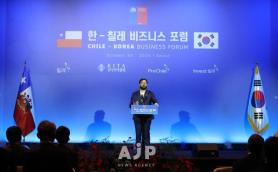
SEOUL -- Chilean public works minister Jessica Lopez has called for South Korean companies' investment in her home country's ongoing transport infrastructure projects. Highlighting the critical role of technology in the mobility sector incorporating highways, airports, and electric vehicle networks, Lopez stressed the need for South Korean companies' participation in construction endeavors and the sharing of their expert know-how in providing cutting-edge technological solutions through long-term collaborative projects.
In an exclusive interview with Aju Korea Daily on March 14, Minister Lopez stated that Chile has engaged in public-private partnership (PPP) projects, injecting over $28 billion into multinational firms for the development of infrastructure encompassing highways, airports, and trains. One of the notable projects is the construction of the Chacao Bridge, spanning 2.75 kilometers (1.7 miles) between Chiloé Island in Chile's southernmost region and the mainland. This ambitious project is poised to become the longest bridge in Latin America. Upon completion, Chacao will link the Pan-American highway route, which extends from Alaska to the southern island of Chile.
"Chile’s landscape is characterized by the Andes Mountains, which traverse the entire country. Connecting the upper and lower parts of the country is very important," Lopez said. She emphasized the crucial involvement of South Korea's main builder Hyundai E&C in the bridge's construction. When the bridge is constructed, people can travel from Chile's mainland to Chiloé Island in about three minutes. Currently, it takes about 45 minutes for people to travel by boat.
Lopez also expressed interest in cooperation on clean energy infrastructure. In Chile, solar power and wind power constitute the largest portion of clean energy sources, with solar power holding the largest share and wind power following closely behind. Despite this, the minister noted that investments from South Korean companies in this sector are quite low. She said: "We are keen to expand our collaboration with South Korean companies, leveraging their expertise and capabilities in infrastructure development."
"South Korea holds a significant position as our fifth-largest commercial partner, yet there is plenty of room to further stimulate investments," Lopez stated, adding that various financial benefits will be offered for those participating in Chile's public infrastructure projects. "Those involved in PPP projects can request an exemption from a value-added tax (VAT) when importing capital goods. Additionally, we plan to guarantee a minimum income in case the demand is lower than expected."
In the long run, Lopez anticipates technology transfers from the South Korean side. "Chile could grow by learning about technological advancements from South Korean experts," the minister stated. During her three-day visit to South Korea, Lopez joined a conference hosted by the Korea International Trade Association (KITA) to discuss expanding South Korea's participation in PPP projects. Along with an official from Hyundai E&C, some 20 entrepreneurs from major South Korean firms, including Samsung C&T and the Korea Airports Corporation, attended the event. After the conference, Lopez also met with South Korea's transport minister Park Sang-woo.
During the meeting with Lopez on March 15, Park emphasized Chile's significant economic partnership with South Korea, established through the Free Trade Agreement (FTA) signed in 2003. As South Korea's first FTA partner, Chile has seen trade volumes increase by an average of four percent annually over the past two decades, reaching $8 billion in 2022. South Korea imported $3.1 billion worth of copper and $1.5 billion worth of lithium from Chile in the same year.
Copyright ⓒ Aju Press All rights reserved.




